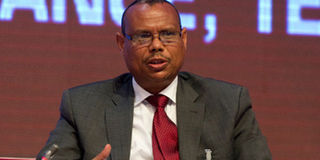Prime
Africa’s economic growth bright - AfDB

Mr Abebe Shimeles, the acting director, macroeconomic policy, forecasting and research department, AfDB
What you need to know:
Positive. The bank expects commodity prices to recover, among other factors
Kampala.
The African Development Bank (AfDB) in its annual report has painted bright picture for Africa, predicting the rebound of economic growth to 3.4 per cent in 2017 and 4.3 per cent in 2018 after marking significant slowdown last year.
The expected pickup is on the assumption that as commodity prices recover, the world economy will be strengthened and domestic macroeconomic reforms are entrenched.
The AfDB said in its report that Africa’s economic growth continued to deteriorate in 2016, due mainly to lower commodity prices, with commodity exporters most adversely affected, but it also stated despite this trend, the majority of non-commodity exporting African countries maintained positive growth.
Slow growth for 2016
The report recently released in Ahmadabad, India, at the start of the 52 Annual Meeting of African Development reveals that in 2016, Africa’s economic growth slowed down to 2.2 per cent from 3.4 per cent in 2015, due to low commodity prices, weak global recovery and adverse weather conditions, which impacted on agriculture production in some regions.
“Although economic headwinds experienced in the last two years appear to have altered the ‘Africa rising’ narrative’, we firmly believe the continent remains resilient, with non-resource dependent economies sustaining higher growth for much longer spell.
“With dynamic private sectors, entrepreneurial spirit and vast resources, Africa has the potential to grow even faster and more inclusively,” said Mr Abebe Shimeles, the acting director, macroeconomic policy, forecasting and research department, at the AfDB.
AfDB also hopes that Africa’s growth outlook remains positive for 2017-18, boosted by expected increases in commodity prices and domestic demand.
Growth drivers
Domestic demand continues to drive Africa’s growth. Meanwhile, better macroeconomic management, increased diversification and an improved business environment are expected to maintain Africa’s growth resilience in 2017-18.
Countries with better co-ordinated and consistent fiscal, monetary and exchange rate policies are able to withstand shocks.
Countries with better co-ordinated and consistent fiscal, monetary and exchange rate policies are able to weather shocks.
The AfDB explains that this growth also coincides with progress in human development: 18 African countries had achieved medium to high levels of human development by 2015.
The AfDB further reveals that foreign direct investment, attracted by the continent’s emerging markets and fast urbanisation, stood at $56.5 billion in 2016 and is projected to reach $57 billion in 2017.




